the 5 key components of financial literacy
When was the last time you sat down to evaluate your overall financial plan? Or took the time to freshen up your financial literacy knowledge? If it has been a while, don’t worry! It’s never too late to start. In fact, the perfect time is right now as April kicks off National Financial Literacy Month!
Financial Literacy Month was established to remind people of how important it is to understand their finances and encourage them to expand their knowledge. At BlueOx Credit Union, we value financial education. We also understand that the process of learning good financial habits can be overwhelming. Because there's an endless amount of information, tips, tricks, blogs, and expert advice on the subject – we decided to start with the basics! Continue reading to learn more about the 5 key components of financial literacy:
“Like all learning, financial education is a process that should begin at an early age and continue throughout life.” – Alan Greenspan, Economist
earn
The first step to better understanding your finances is figuring out how much money you earn. Start by looking at your paycheck and identifying the following amounts:
- Gross Income – This is your pre-tax income or the total amount that your employer is paying you. You use this amount for various financial transactions including applying for a loan or negotiating a new salary.
- Net Income – This is the actual amount that you are paid after taxes and deductions have been taken out of your gross income. This is the amount that you will use to make purchases, save and invest with, and create a budget around.
- Deductions – These include everything that is taken out of your gross income. For example – your retirement plan or health insurance.
spend
Now that you understand how much you earn - you can decide how you want to spend! Financial experts highly suggest creating a budget before you spend. A budget will help prevent you from overspending and keep you focused on your financial goals.
For more information regarding establishing good credit, check out our blog: Budgeting 101
Tracking your spending is a great way to become more finically literate! First, look through your monthly statements – including all your checking accounts and credit cards. Once you have this information, categorize your spending into groups such as household items, monthly bills, or subscriptions. This is the easiest way to identify where you're overspending and where you should focus your savings.
save and invest
Speaking of savings – the third component of financial literacy is "save and invest”! We can all agree that it's essential to save, but what should you save for? Well, it's different for everyone! It could be for retirement, a new vehicle, or a dream vacation. How much you save and what you save for depends on your financial situation.
When considering your savings and investments, you must determine your financial goals. It’s hard to get motivated to save if you don’t have a specific reason for it! When setting your goals – make sure you use the S.M.A.R.T method: Specific, Measurable, Achievable, Relevant, and Time-Bound. This approach will help you stay on track and within a specific timeline!
borrow
Even the most responsible savers will likely have to borrow money at some point. Whether you're borrowing student loans for college, taking out a mortgage for a new house, or opening a credit card for everyday purchases – there are a couple of things you need to keep in mind:
compare your options
When it comes to borrowing money, don’t immediately sign on the dotted line before doing your research! Compare all your options and ask your financial advisor questions. For example, there's a huge difference between a low APR (Annual Percentage Rate) and a high one. APR reflects both the interest rate and fees that you're going to end up paying. A higher interest rate = paying more money.
maintain your credit score
Borrowing money can be harmful to your credit score if you're not careful! Keeping high balances on your credit cards, frequently missing payments, and defaulting on your loans are all ways that'll negatively impact your credit score. Make sure you're borrowing within your means and maximizing the use of your borrowed funds.
Pro Tip - If you find yourself in a position where you cannot make your payments – communicate with your creditors immediately! Most financial institutions will work with you to find a solution to protect your credit score.
protect
Make sure you're protecting any money that you make. Something as simple as regularly reviewing your bank accounts for suspicious activity can make a huge difference! Scams and identity theft are highly prevalent – especially as technology continues to develop. Make sure you keep important passwords and documents safe and purchase adequate insurance in case of an emergency.
Pro Tip - Did you know that around 15 million people are victims of identity theft every year?! Defend your family, identity, and credit today by signing up for BlueOx Credit Union’s IDProtect® Plus service:
what’s next?
Now that you've learned some basic financial literacy knowledge, what’s next? You could always keep learning! Our BlueOx Blog offers content on a wide range of financial topics. Check out some of our favorites below:
- how to improve my credit score
- what to do if you can't pay your bills
- top 10 cyber security tips
- how do credit cards really work?
« Return to "BlueOx Blog"

